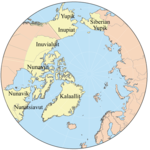Eskimology: Difference between revisions
Reverted 1 edit by 192.199.225.59 (talk): Rv section blanking |
Adding short description: "Complex of humanities sciences relating to Eskimos" (Shortdesc helper) |
||
| Line 1: | Line 1: | ||
{{Short description|Complex of humanities sciences relating to Eskimos}} |
|||
[[File:Inuit conf map.png|thumb|250px|The map of the [[Inuit Circumpolar Council]]<br>Eskimo peoples: {{bulleted list | [[Yupik peoples]] (Yupik, Siberian Yupik) | [[Inuit]] peoples (Iñupiat, Inuvialuit, Nunavut, Nunavik, Nunatsiavut, Kalaallit)}}]] |
[[File:Inuit conf map.png|thumb|250px|The map of the [[Inuit Circumpolar Council]]<br>Eskimo peoples: {{bulleted list | [[Yupik peoples]] (Yupik, Siberian Yupik) | [[Inuit]] peoples (Iñupiat, Inuvialuit, Nunavut, Nunavik, Nunatsiavut, Kalaallit)}}]] |
||
Revision as of 04:55, 18 February 2021

Eskimo peoples:
- Yupik peoples (Yupik, Siberian Yupik)
- Inuit peoples (Iñupiat, Inuvialuit, Nunavut, Nunavik, Nunatsiavut, Kalaallit)
Eskimology /ˌɛskəˈmɑːlədʒi/ or Inuitology is a complex of humanities sciences studying languages, history, literature, folklore, culture, and ethnology of people speaking Eskimo–Aleut languages and Eskimo (Inuit–Yupik)–Aleut peoples in chronological and comparative context. This includes ethnic groups from the Chukchi Peninsula on the eastern tip of Siberia of Russian Federation to Alaska of the United States, Northern Canada (incl. Nunavik and Nunatsiavut), and Greenland of Denmark.[1] Originally, a Eskimologist or Inuitologist was primarily a linguist or philologist who researches Eskimology scholar.[clarification needed]
History
Eskimology traces its beginning to the pioneering work of Hans Egede (1745) and David Crantz (1767) in Greenland.[2] Eskimology has traditionally had a particular focus on Greenland studies owing to the long-standing relationship between Denmark and Greenland established in the early 18th century, and the academic discipline of Eskimology is today centered at the University of Copenhagen. The term "Eskimology" was not common until 1967, when a genuine department was established and officially named the Department of Eskimology. From the late 1960s, Eskimology changed its focus toward increasingly contemporary and global political issues.[1] In 2019, the department changed its name to Greenlandic and Arctic Studies Section (a section within the Department of Cross-cultural and Regional Studies). Greenlandic and Arctic Studies Section offers full BA and MA programmes. In these programmes, the study of Greenlandic language and the socio-cultural issues of Greenland/ the Arctic are central.
List of Eskimologists
- Knut Bergsland
- Ann Fienup-Riordan
- Michael Fortescue
- Sven Haakanson
- Erik Holtved
- Steven A. Jocobson
- Lawrence D. Kaplan
- Michael E. Krauss
- Margaret Lantis
- Jeff Leer
- Edna Ahgeak MacLean
- Georgy Menovshchikov (ru:Меновщиков, Георгий Алексеевич)
- Osihito Miyaoka
- Wendell H. Oswalt
- Knud Rasmussen "father of Eskimology"
- Jørgen Rischel
- Jerrold Sadock
- Wolf Seiler
- William Thalbitzer
- James W. VanStone
See also
- da:Eskimologi og Arktiske Studier («Eskimology and Arctic Studies»)
- Inuit Tapiriit Kanatami ("Inuit United with Canada")
- Alaska Native Language Center
References
- ^ a b Søren Thuesen (2005), Eskimology. In Mark Nuttall (editor). Encyclopedia of the Arctic. Vol 1,2 and 3. pp. 585-586
- ^ Fienup-Riordan, Ann. (1990). Eskimo Essays: Yup'ik Lives and Howe We See Them. New Brunswick, NJ: Rutgers University Press.
External links

